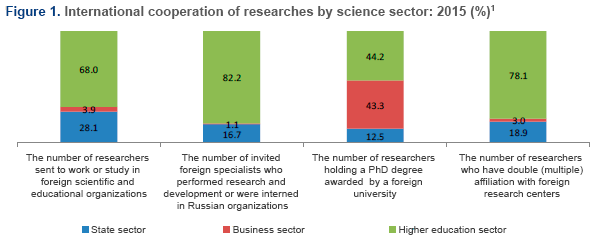International Mobility of Russian Researches
The new issue of the “Science, Technology, Innovation” series presents data on the involvement of Russian scientists in international mobility and cooperation in research and development (R&D).
The information bulletin is based on data from a specialized survey conducted by the HSE Institute for Statistical Studies and Economics of Knowledge with financial support of the Ministry of Education and Science of Russia; data from Federal statistical observation; and results of the project “Monitoring Survey of Highly Qualified R&D Personnel” (HSE, 2016).
Integration of researchers into the world scientific networks and work in international and foreign scientific centres encourage a high level of their qualifications. But the results of the inventory survey of 2015 showed that Russia has a very low level of participation in the international exchange of researchers. The share of R&D organisations participating in the international exchange of fixed-term staff is less than 3%.
Out of the total number of researchers in 2015, only 3515 people (0.9%) were sent to work or study in foreign scientific and educational organisations for three months or more. Universities participate more actively in international cooperation: 68% of researchers going to work or to take an internship in foreign organisations are from the Higher education sector (Figure 1). For the public sector this share is 28.1%, while business sector organisations very rarely send researchers to long-term foreign business trips or internships.
Inventory survey of the R&D sector also revealed a low level of synchronous mobility of Russian researchers, when scientists work simultaneously in several organisations located both in their own country and abroad. In 2015, only 1147 people (0.3%) had a double (or multiple) affiliations with foreign research centres and (or) universities. Data on the distribution of such scientists by science sector confirm that universities are more active in international cooperation: 78.1% of researchers who have double (multiple) affiliations with foreign research centres are engaged in the higher education sector. Researchers employed in business sector organisations, practically do not participate in this form of international cooperation.

The number of foreign R&D specialists invited at least for 3 months a year or interned in Russian organisations is also low — 1993 people (0.5% of the total number of researchers in 2015). The majority (82.2%) of such specialists were invited by organisations of the higher education sector, 16.7% of public sector organisations and only 1.1% of invited foreign specialists carried out their activities in the business sector. Approximately every third guest foreign specialist (32.4%) was under 39 years old.
In 2015 the outgoing mobility of Russian scientists was 1.8 times higher than incoming mobility, that is on average one foreign specialist who came to our country versus two Russian scientists who went to work or study abroad. For comparison: in 2011 this ratio was one to three. During 2011—2015 the number of foreign specialists attracted increased by 33.1%, while the number of Russian scientists travelling abroad decreased by 18.4%.
The number of researchers holding a PhD degree awarded by a foreign university was 651 people (0.2% of the total number of researchers in 2015). About half (44.2%) of such researchers are employed in the higher education sector, followed by the business sector, which accumulates 43.3% of researchers holding a PhD degree awarded by a foreign university. Thus, business sector organisations, are practically not participating in the current international cooperation, but at the same time are playing the role of employers for scientific personnel who have obtained a scientific degree abroad.
Organisations of the higher education sector are most active in all forms of involvement in international R&D from 44 to 82% of the corresponding indicators mentioned above). We can assume that these figures are a logical result of the implementation of programs and initiatives aimed at integrating Russian science and higher education to the international co-operation, as well as increasing the competitiveness of leading Russian universities in the world scientific and educational space.
1 The sector of non-profit organisations is excluded from the analysis since the data are statistically insignificant.
